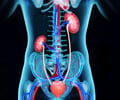Alanyl-glutamine, a cytoprotective agent in dialysis fluid helps patients by reducing the risks in peritoneal dialysis.
- Alanyl-Glutamine containing peritoneal dialysis fluid receives orphan drug designation in patients suffering from chronic kidney failure.
- Reduces the risk of causing a damage to the abdominal tissues resulting in peritoneal membrane failure and peritonitis.
- Keeps patients to stay healthy for a long time by relieving the problems that are associated with usual peritoneal dialysis and hemodialysis treatment.
New Peritoneal Dialysis fluid
Alanyl-Glutamine, when added to the peritoneal dialysis fluid, protects the peritoneal tissue by its cytoprotective properties. This new treatment approach prevents the severe complications such as peritoneal membrane failure and peritonitis which are associated with the currently used peritoneal dialysis fluid worldwide. Zytoprotec, a biopharmaceutical company in Austria discovered the beneficial effects of alanyl-glutamine with the aim to improve the treatment outcomes in patients who are suffering from end-stage kidney disease. The novel peritoneal dialysis fluid that contains alanyl-glutamine has successfully completed a randomized, double-blinded phase II clinical trial. It is currently ready to undergo its crucial phase III clinical trial in nearly about 300 patients suffering from chronic kidney failure both in the United States and Europe.The United States FDA has granted an orphan drug designation for the new dialysis fluid that contains alanyl-glutamine for treating patients with the end-stage renal disease. This approval will help patients who undergo peritoneal dialysis to stay healthy for longer by avoiding the damage of abdominal tissues. This therapy is considered to be a breakthrough in the treatment of chronic kidney failure which will reduce a huge burden on patients as well as the healthcare system.
What is Peritoneal Dialysis?
Peritoneal dialysis is one of the dialysis procedure intended for patients suffering from kidney failure. It involves the introduction of a specific fluid into the lining of the abdomen or peritoneum to filter the blood inside the body. This procedure is employed to correct the electrolyte imbalance and to remove excess fluid and toxins in patients with kidney failure.The dialysis solution used in peritoneal dialysis is on WHO’s list of essential medicines and considered to be one of the safe and effective medicines needed in a healthcare system. The solution is normally made up of dextrose or icodextrin bicarbonates, minerals, and isotonic solution of sodium chloride.
There are two types of peritoneal dialysis which are
- Continuous ambulatory peritoneal dialysis (CAPD)
- Automated peritoneal dialysis (APD)
What are the advantages of Peritoneal dialysis?
The advantages of peritoneal dialysis are- Cost-effective
- Can be performed at home or at work
- Protects residual kidney functions
- Involves advanced techniques, exchange systems or new generation of dialysis solutions
- Increases quality of life compared with hemodialysis
What are the complications of peritoneal dialysis?
The complications of peritoneal dialysis includes- Infection or bleeding in the abdominal area
- Elevated blood sugar levels
- Blockage of the catheter
- Hernia
- FDA Grants Orphan Drug Designation to Zytoprotec's Novel Dialysis Fluid - (http://www.checkorphan.org/news/fda-grants-orphan-drug-designation-to-zytoprotecs-novel-dialysis-fluid)
- Peritoneal Dialysis - (https://www.niddk.nih.gov/health-information/kidney-disease/kidney-failure/peritoneal-dialysis)
- Clinical advantages of peritoneal dialysis - (https://www.ncbi.nlm.nih.gov/pubmed/19270233)
Source-Medindia
















